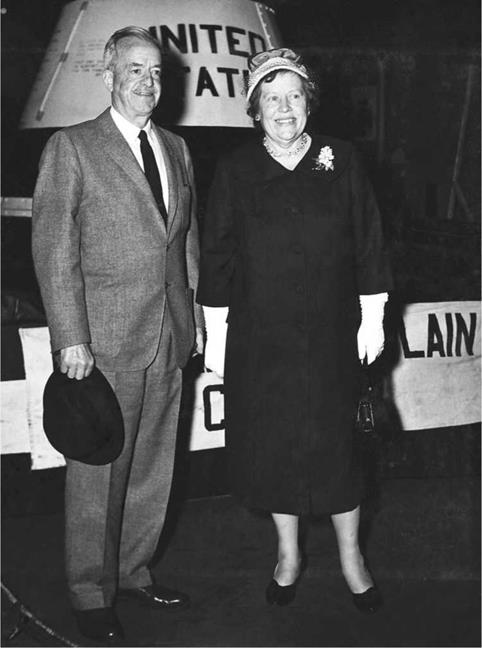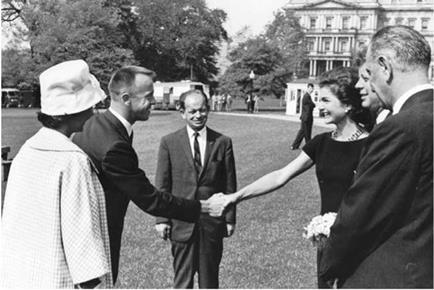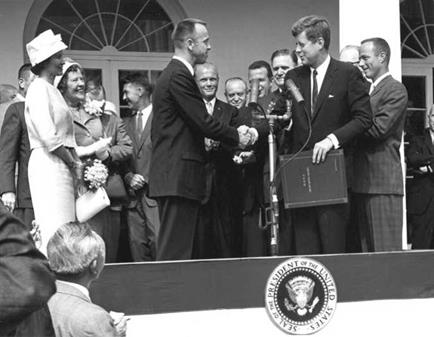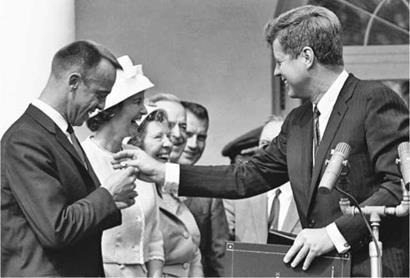TO WASHINGTON
After dinner on Saturday night, a relaxed Shepard joined others on wooden benches at the open-air movie lot at the base for a screening of The Grass is Always Greener, a comedy starring Cary Grant.
The next morning, once again casually dressed and indistinguishable from several hundred other men at the air base, Shepard had breakfast with Grissom in the mess hall. By tacit consent, everyone on the base had agreed to allow him to simply go his way normally without any bustle or crowding. It would also be his last day of leisure on the off-shore refuge.
On Monday, under orders from the President, Shepard flew to Washington, D. C., along with the other astronauts. At Andrews AFB, where they landed in suburban Maryland at 9:33 a. m., Shepard was the last one off the airplane. Waiting to meet him at the foot of the ramp was his wife Louise, her parents Phil and Julia Brewer, his parents Alan and Renza, and his sister, Polly Sherman. There were hugs, kisses and handshakes before they were ushered over to a microphone set up nearby so that he could briefly address a crowd of almost 1,000 cheering people who had gathered to greet him. He thanked everyone at the base for their welcome and delivered a few words of encouragement prior to escorting his wife to the waiting helicopters that would quickly convey them to the south lawn of the White House and a reception by the President and First Lady at which he would receive NASA’s highest award, the Distinguished Service Medal. The only previous such medal had been awarded two years earlier to John W. Crowley for his 38-year contribution to the nation’s aircraft, spacecraft and missile programs.
The presentation ceremony took place on a specially built platform in the Rose Garden, just outside the White House, and was conducted in a very relaxed manner. Kennedy and Shepard shook hands more like college classmates than President and hero. Shepard was relaxed and easy during the moments of greeting before it began. As he remarked, “I thought last Friday was a thrilling day, but this surpasses it.” [12]
|
|
After the USS Lake Champlain had returned to Quonset Bay following the retrieval of Alan Shepard, his parents, Alan and Renza, were given a grand tour of the ship, which included a visit to the carrier’s hangar bay where a mockup of Freedom 7 was perched on the actual platform which had held their son’s spacecraft after recovery. (Photo courtesy of Larry Kreitzberg)
|
|
Alan and Louise Shepard meet the Kennedys, with Vice President Lyndon Johnson looking on. In center of the picture is NASA’s Public Affairs Officer, John ‘Shorty’ Powers. (Photo courtesy of Dean Conger/NASA)
|
|
With his fellow Mercury astronauts looking on, Shepard shakes hands with President Kennedy at the White House reception. (Photo courtesy of Dean Conger/NASA)
In his preamble, Kennedy said the nation was proud of Shepard and his fellow astronauts, noting that his flight was made under conditions of full publicity in a free society. The United States had “risked much and gained much,” he stated. This was meant as an emphatic reminder that the Soviet Union, operating in a closed society, was following a tradition of secrecy in its space program that stood in spectacular contrast to the methods endorsed by the American nation. The President also paid a grateful tribute to the other astronauts and to the NASA officials who had brought the agency together and carried it through to that point. They were key members of the team that made the flight such a great success. To the 500 dignitaries gathered in the Rose Garden, the President said, “We should give them all a hand.” And then, to distinguish the astronauts from the assembled bureaucrats, he jokingly described them as “the tanned and healthy ones – the others are Washington employees.”
Kennedy then read the NASA citation, which pointed out that Shepard’s flight “was an outstanding contribution to the advancement of human knowledge and space technology and a demonstration of man’s capabilities in suborbital space flights.” He then described the medal as “a civilian award for a great civilian accomplishment.” [13]
At this point an air of informality took over, adding a special note of its own to the ceremony. During the presentation Kennedy fumbled for a moment, dropping the medal with its blue and white ribbon onto the wooden floor of the platform. But he quickly retrieved the medal and handed it to Shepard, saying he was proud to present “this decoration – which has gone from the ground up,” thereby creating a storm of laughter. But then, instead of following custom and pinning the medal on Shepard’s coat, Kennedy simply handed it over, saying, “Here.” After Shepard had responded in acknowledgement of the honor bestowed on him, Jacqueline Kennedy whispered to her husband that he ought to have pinned the medal onto the astronaut’s jacket. Taking it back from Shepard, the President quipped, “Let me pin it on; I’ll do my duty.” [14]
|
Amid laughter, the President presents Shepard with the NASA medal he had dropped on the ground. (Photo courtesy of Dean Conger/NASA) |














